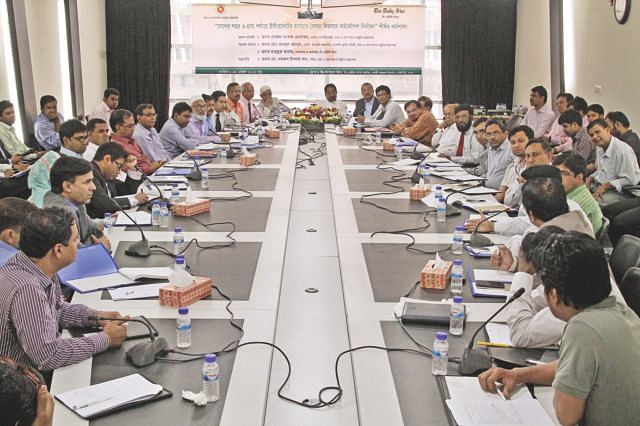Call for deep cuts in internet prices
 Analysts take part in a roundtable -- Bridging the internet usage gap: urban and rural areas -- organised by the ICT ministry and The Daily Star at the newspaper's office in the capital yesterday. Photo:Star
Analysts take part in a roundtable -- Bridging the internet usage gap: urban and rural areas -- organised by the ICT ministry and The Daily Star at the newspaper's office in the capital yesterday. Photo:Star
The country needs to make internet more affordable to achieve the penetration levels it so desires, analysts said yesterday.
“Internet penetration is eight times lower in rural areas than in urban ones. So there is need of enforcement and incentive,” said Nazrul Islam Khan, information and communication technology (ICT) secretary.
Although the government plans to reduce the bandwidth price from Tk 8,000 to Tk 5,000 for per megabits per second, Khan suggested going step ahead and slashing it to Tk 3,000.
“The less the internet price, the more the number of users.”
Khan's comments came at a roundtable -- Bridging the internet usage gap: urban and rural areas -- organised by the ICT ministry and The Daily Star at The Daily Star Centre.
“The main hurdle to reaching the rural areas is the limitation of backhaul facilities,” said Md Raqueebul Hasan, director of Bangladesh Telecommunication Regulatory Commission (BTRC).
The price of per megabit internet bandwidth is Tk 8,000, but to take that bandwidth to say Khulna the cost goes as high up as Tk 42,000, he said.
Although the government has taken initiatives to reduce the backhaul price by 70 percent by leasing a 4,000 kilometres optical fibre cable line to two transmission companies, much needs to be done.
The 3G connection, Hasan said, will be crucial to achieving the desired internet penetration levels.
“If we can create demand from users, the supply side will automatically increase,” he said, while citing the case of developed countries as examples.
Referring a study by the Boston Consulting Group, the BTRC director said by 2020 the ICT sector will contribute around 2.6 percent to the GDP, create 42 lakh new jobs and bring in Tk 12,800 crore in revenue to the government.The BTRC director also suggested forming a broadband commission to consult the government for internet-related issues.
The lack of content in Bangla has been slowing down the growth of internet in the country, according to Aktaruzzaman Manju, president of Internet Service Providers Association of Bangladesh (ISPAB).
“Why should a boy or girl subscribe to internet services if they do not have anything to do with it other than logging on to Facebook?”
He complained that the government has contributed to the higher costs of internet by creating middlemen between the submarine cable and internet service providers (ISPs) by way of internet gateways and fibre cable transmission companies.
Manju cited the 15 percent value-added tax as a considerable barrier to internet penetration, adding that government would receive far higher than the Tk 42 crore it now receives annually from the sector if it eliminates the tax.
He suggested creating a model thana or village in every district where all functions would be conducted online and others would be tempted to follow suit.
The cost of transmission accounts for 70 percent of ISPs' costs, said Almas Kabir, vice-president of ISPAB.
“This cost will have to come down for internet costs to reduce at the end user level.”
Md Monwar Hossain, managing director of Bangladesh Submarine Cable Company Limited, too, urged the government to reduce VAT and taxes on internet and internet-related equipment.
“We will have to move to the villages with all of our resources and distribute those equally to reduce the digital divide between the rural and urban people,” said Mostafa Faruque Mohammed, ICT minister.
“If we go to the villages with our laptops and chargers, change is bound to happen.”
Internet is badly needed for the country's advancement, said Mahfuz Anam, editor of The Daily Star.
“The world is moving very fast by the blessings of the internet, so we will have to have dynamism to reach the goal. Still we are just using one forth of our total internet capacities that is 200 gigabits per second.”
He requested the participants of the workshop not to forget the discussion after the meeting ends.
The country's over population is not a hindrance but a source of strength, said Salehuddin Ahmed, managing editor of The Daily Star.
“It's just that we failed to leverage them properly.”
“We will succeed if we can utilise the educated people within the ICT sector, just as we did with the unskilled people for the readymade garment sector,” said Md Abdul Wadud, chairman of the parliamentary standing committee on the ICT ministry.
He suggested a taskforce be formed to work out how best to use the Tk 571 crore The World Bank is providing for ICT development in the country.

 For all latest news, follow The Daily Star's Google News channel.
For all latest news, follow The Daily Star's Google News channel. 



Comments